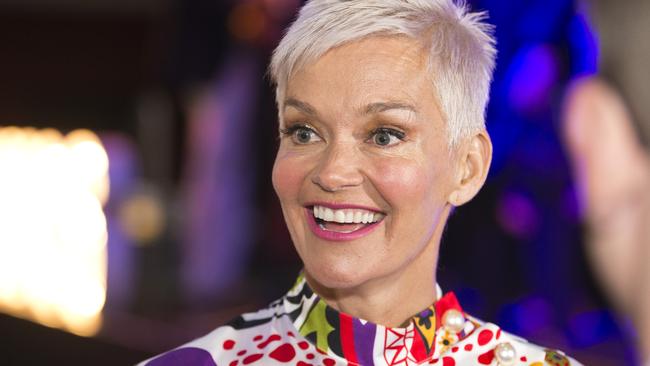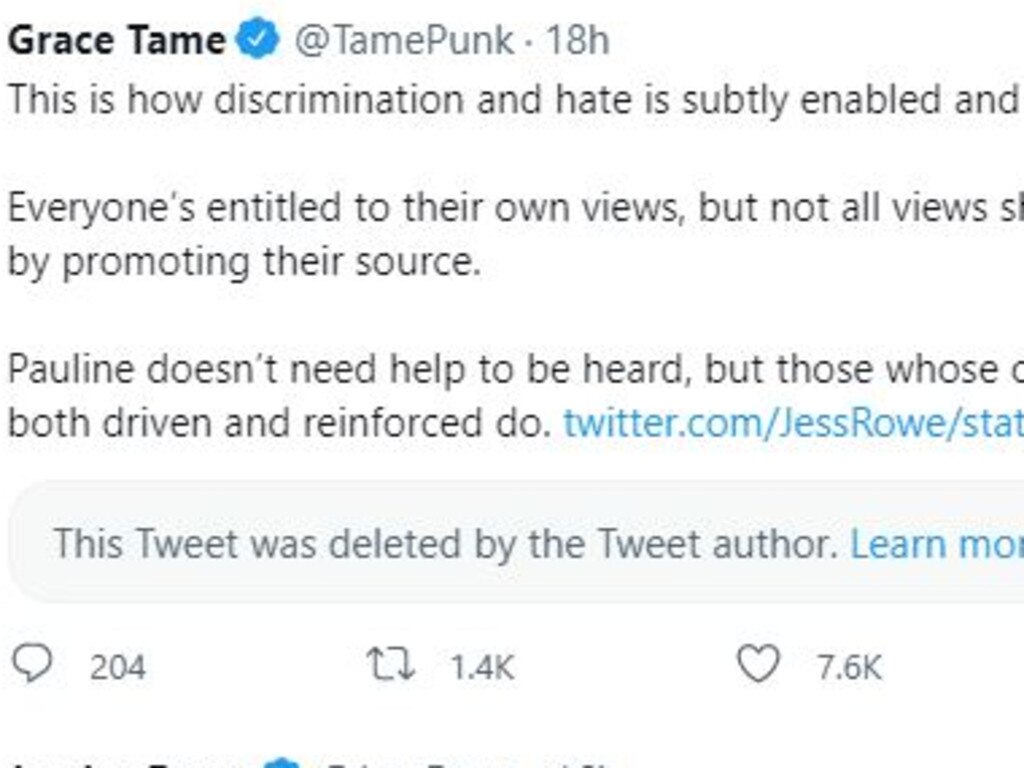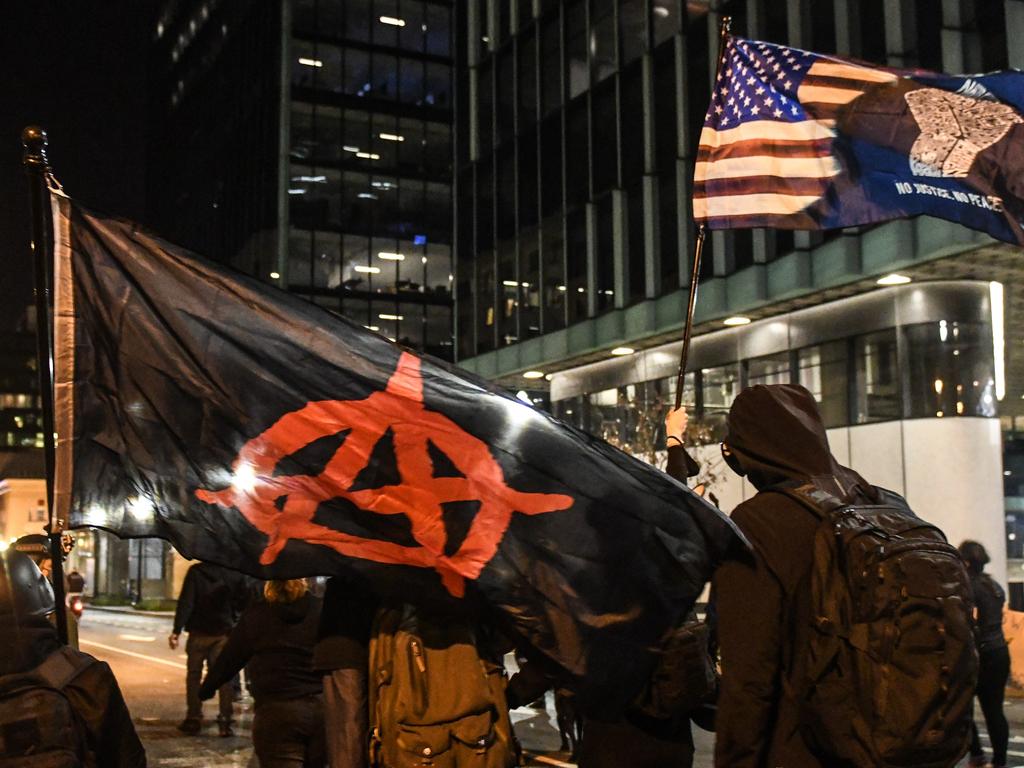
“Ill-informed,” as you probably know, is now a synonym for “innocuous”. Next you acknowledge those most prominent in calling out your transgressions. “I would especially like to thank such and such, who I admire unreservedly, for bringing this to my attention”.
What follows is not an excuse but rather an explanation for why you committed the unforgivable. “I have only just begun to recognise how my privilege has blinded me to my ignorance.” To remove any doubt of your exercising independent thought, expressly repudiate the supposedly offensive subject matter. “Let me assure you, his/her views are the opposite of mine.” You know the rest: resolve to do better, undertake to educate yourself, be an ally for the marginalised and oppressed, and surrender what little remains of your dignity and self-respect.
I’ve listened to your comments & asked @LiSTNRau to take down the Pauline Hanson interview. My statement is below. pic.twitter.com/S2PPLL8SeW
— Jessica Rowe (@JessRowe) September 29, 2021
That is the lot of journalist and former television presenter Jessica Rowe, host of the podcast ‘The Jess Rowe Big Talk Show’. Referring to her podcast guest Pauline Hanson, Senator and leader of One Nation, Rowe tweeted last week: “She talks love, raising kids & why she keeps going”. The Twitter indictments soon followed. “This is how discrimination and hate is subtly enabled and normalised,” said Australian of the Year Grace Tame. “You’re platforming a racist,” tweeted indigenous author and playwright Nakkiah Lui. “If you’re not interrogating them, you’re validating those racist opinions.” And so it continued.
By day’s end, Rowe had capitulated. “This will be the start of a bigger conversation for me and with those who this topic directly affects,” she tweeted, advising that she had asked for the episode to be removed from the platform. “Kindness is at the heart of who I am,” she offered pitifully. It did not matter that Rowe already suffers from fragile mental health, or that her struggles with depression and anxiety are well-documented. Or should I say it mattered in that her vulnerability only emboldened those motivated by mob psychology.
A journalist publicly browbeaten and intimidated can at least expect the support of her female colleagues. Provided, that is, she has not infringed progressive orthodoxy, in which case they will not only refuse to defend her, but instead lead the calls for her to be censored. “That isn’t the role of the media – it’s not to do fluff pieces on someone who is divisive and dangerous,” Network Ten journalist Antoinette Lattouf told gobsmacked 3AW host Neil Mitchell, who rightfully retorted it was not her or anyone else’s right to tell Rowe how to conduct interviews.
Im now bracing myself for the fixation on Jessica Rowe’s hurt feelings by media colleagues & other white women. A predictable cycle. Rather than examine whats required to be anti-racist there’ll be sympathy about ‘pile-ons’ & lots of ‘sending hugs’ her way. Media: DO BETTER
— Antoinette Lattouf (@antoinette_news) September 29, 2021
“It is, of course, Jessica Rowe’s prerogative to invite whomever she likes on her podcast but it is the prerogative of the public to respond to those choices as they like,” wrote Women’s Agenda contributing editor Georgia Dent. Presumably that includes abuse such as that tweeted directly to Rowe which labelled her a “f..king moron and grifter”.
But how is this for specious reasoning? “The public response was swift: by inviting Pauline Hanson on her show Jessica Rowe implicitly endorsed her which is fine if that’s something she’s comfortable with,” continued Dent. “On reflection Rowe decided she isn’t,” she stated.
Dent – a self-described “passionate advocate for gender equality” – is kidding herself if she thinks Rowe’s “decision” to remove the interview was a case of reflection. Her claim that Rowe’s inviting Hanson to take part in the podcast equates to endorsement of the latter’s views is typical of groupthink mindset. In her original tweet that gave publicity to the interview, Rowe expressly stated “Pauline Hanson is someone I’ve butted heads with over the years, I don’t agree with her politics, but she fascinates me as a person”.
As ABC Media Watch host Paul Barry observed this week, “Rowe should surely have held her nerve and defended the interview, rather than delete it”. As was obvious from the responses to her attempt to placate the mob, it has brought her not forgiveness but contempt.
Rowe should instead have responded with a metaphorical middle finger. “Thank you for your feedback,” she could have written. “I have been told by numerous people it would be inappropriate of me to interview a certain guest whose idea of political representation is to cater to populist sentiment and glib phrases. A woman whose only job outside politics was working in a fish and chip shop. I hear and understand you. Accordingly, I will not be interviewing New Zealand prime minister Jacinda Ardern”.
Another violent attack on a female journalist by grandstanding "progressives" who lack the wit or curiosity to try and understand a different worldview. That is what journalism should be and why Jessica Rowe can be proud of her work. https://t.co/YbMHKJJZRo
— Chris Uhlmann (@CUhlmann) September 30, 2021
please hire some non-white people to tell you how stupid things like this are
— Alex McKinnon (@mckinnon_a) September 29, 2021
**************************************************************************
On that note, you might remember that just under a year ago the periodical Quarterly Essay published a piece titled ‘The High Road: What Australia Can Learn From New Zealand’. The author was ABC 7.30’s chief political correspondent Laura Tingle, who was most impressed by our neighbour’s handling of the pandemic, particularly Ardern’s insistence on applying the elimination model.
“From Australia, we watched in shock, scepticism or admiration,” wrote Tingle. “Our political leaders were wrestling with the same issues, but prevaricating by Ardern’s standards … Our path was more gradual and the messages more mixed, to say the least. In Australia we were trying to have the best of both worlds: to limit the impact of the virus, but also to limit its economic impact by minimising the shutdown … New Zealand’s response to the coronavirus is just the latest reason Australians have sometimes looked wistfully, or at least with interest, across the Tasman.”
The elimination model is no more, Ardern having quietly announced this week her government has abandoned that policy. The country has 350 active cases, having recorded 39 new community transmission cases yesterday. Auckland has been in lockdown since mid-August. “With this outbreak, and Delta, the return to zero is incredibly difficult,” Ardern said. It was, wrote Jack Tame, the host of New Zealand’s Q + A program, “a frustrating and confusing watch for anyone trying to understand the Government’s true position on the state of the Delta outbreak and its strategy from this point forth”.
As Britain’s Telegraph noted this week, Ardern’s failure to ensure Kiwis were vaccinated in sufficient numbers could mean New Zealand is faced with “a delayed health disaster”. Currently only 49 per cent of the eligible population is fully vaccinated compared to 58.4 per cent of Australians aged 16 and above.
Contrast Ardern’s demeanour with that she displayed on August 17 when she announced a national three-day lockdown regarding a single Delta case in Auckland. Asked by a journalist what her message was to those questioning the restrictions, Ardern pointed west theatrically. “Australia,” she said. “We’ve seen the dire consequences of taking too long to act in other countries, not least our neighbours. We want to be short and sharp rather than light and long. We’ve seen what happened in Sydney. We don’t want that experience here.” And for good measure: “Our case has originated in Australia”.
That was to be expected from Ardern, an artful deflector of difficult questions and this country’s leading foreign fault-finder. This hectoring and blaming of Australia are tedious but crudely effective tactics. For example, in a column for Sydney Morning Herald on Monday, Henry Cooke, New Zealand’s chief political correspondent for the media outlet Stuff wrote that “Kiwis bear a grudge towards Australia, the source of our outbreak”.
That is an interesting take, especially given Auckland’s patient zero is a Kiwi. He flew from Sydney on August 7 as part of the managed “red zone” flights that New Zealand’s Covid Response Minister, Chris Hipkins, announced on July 9 for Kiwis wanting to return from New South Wales. To facilitate this, the New Zealand government dropped pre-departure Covid testing, instead directing travellers into managed isolation on their return. The patient concerned was tested on August 8 in Auckland, and the following day after registering positive was moved to Jet Park, the country’s main quarantine facility. By then he had already passed the virus on to a family in an adjacent room at the Auckland Crowne Plaza. All of this is Australia’s fault, you see.
So what were Ardern’s priorities when this was happening? Well, a week before this positive test, she was addressing Pacific dignitaries at an Auckland ceremony, where she formally apologised for the “racist” dawn raids of the 1970s in which overstayers were arrested and deported – events that took place nearly 50 years ago, almost 10 years before Ardern was born.
As the ABC reported: “Ms Arden also took part in a traditional Samoan ritual known as an ifoga, in which the subject seeks forgiveness by exposing themselves to a kind of public humiliation. Members of the Pacific Island community pulled a large white mat over Ms Ardern’s head that completely covered her.”
No doubt at Monday’s press conference she was desperately wishing they would do the same.








Self-abasement has become a cliched ritual on social media, and it goes something like this. “Thank you everyone for your constructive feedback,” says the person concerned, ‘feedback’ being a euphemism for harassment and abuse. “It has given me the opportunity to reflect on my ill-informed comments”.